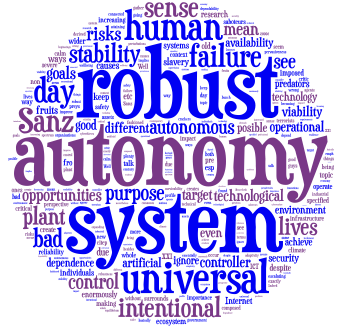|
An ASLab Research Seminar
Robustness and Resilience
for Autonomous Systems
Ricardo Sanz
Place: Aula de Seminarios de Automática
Time: December 12, 2013 / 12:30-14:00
Our lives depend on the technical infrastructure that surrounds us. The contemporary -beginnings of XXI century- human ecosystem is composed not just of our preys, our predators, the fruits to gather and the inclement climate. If we consider our day-to-day lives we found an escalating paraphernalia of artificial assets that are critical for our wellbeing. Well being is obviously good; what is not so good is our dependence on it and the slavery that this implies.
 Henceforth, the human impact derived from the failure of these systems is becoming enormously severe, threatening the economy, the security of nations and organisations, the equilibrium of the environment and even the safety of human individuals. The increasing complexity of both the plant, the operational environment and the requirements imposed to it create a wider spectrum of opportunities for failure. The expanding pervasiveness and importance of the connected ICT (esp. the Internet), creates a whole bunch of new opportunities for saboteurs, recreational crackers, terrorists, professional cyberthieves or government cyberwarfare agents.
Henceforth, the human impact derived from the failure of these systems is becoming enormously severe, threatening the economy, the security of nations and organisations, the equilibrium of the environment and even the safety of human individuals. The increasing complexity of both the plant, the operational environment and the requirements imposed to it create a wider spectrum of opportunities for failure. The expanding pervasiveness and importance of the connected ICT (esp. the Internet), creates a whole bunch of new opportunities for saboteurs, recreational crackers, terrorists, professional cyberthieves or government cyberwarfare agents.
We are interested in these technological systems and how to improve their operational profile. However, besides the "intentional" risks, i.e. the risks due to the bad intentions of the bad guys, there are plenty of good, old-fashioned ways of things going wrong in an industrial plant. I'm more interested in non-intentional causes of failure but, nevertheless, we cannot ignore the intentional ones if we target an universal technology for autonomy.
We are interested in technology for making systems autonomous, and, in this context, a topic of research is how to achieve "robust autonomy". With this I essentially mean that a system -the autonomous system- will be able to operate without human supervision, attaining the pre-specified goals despite the possible perturbations that may occur.
Said this way, the purpose of robust autonomy is, basically, the same as the purpose of any controller. Indeed, from a critic perspective, there are may terms that seem to mean exactly the same: control, stability, robustness, resilience, survivability, reliability, dependability, availability, adaptivity, viability, etc. All them talk about "keep calm and going on".
Find more about Ricardo Sanz.
|
